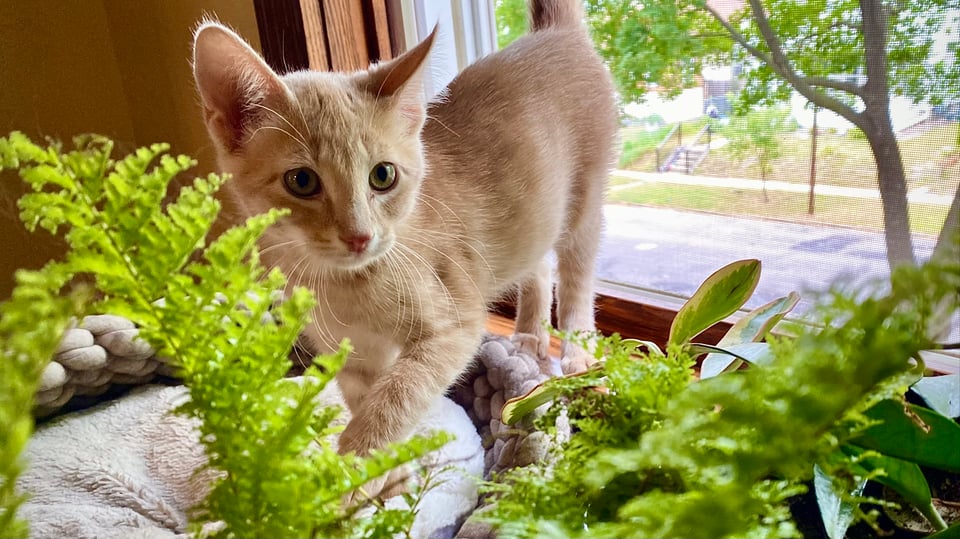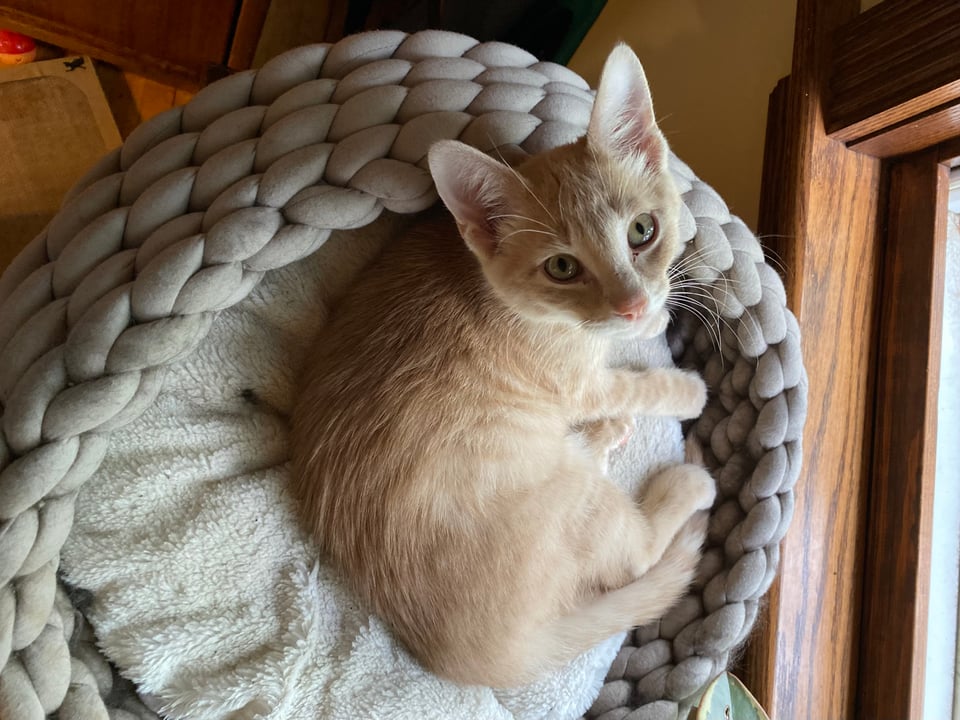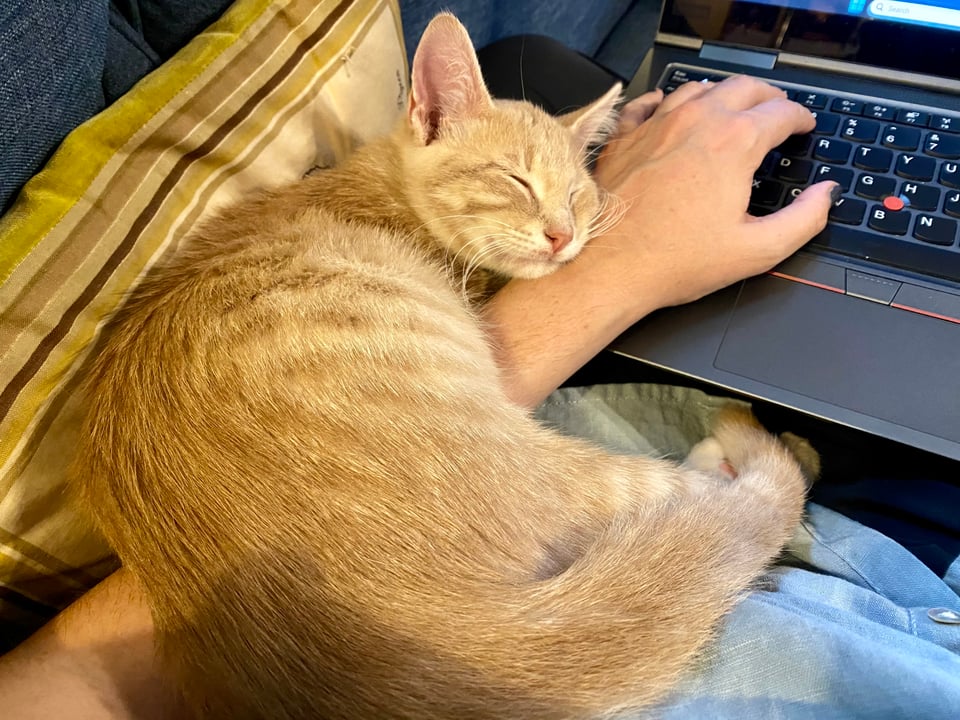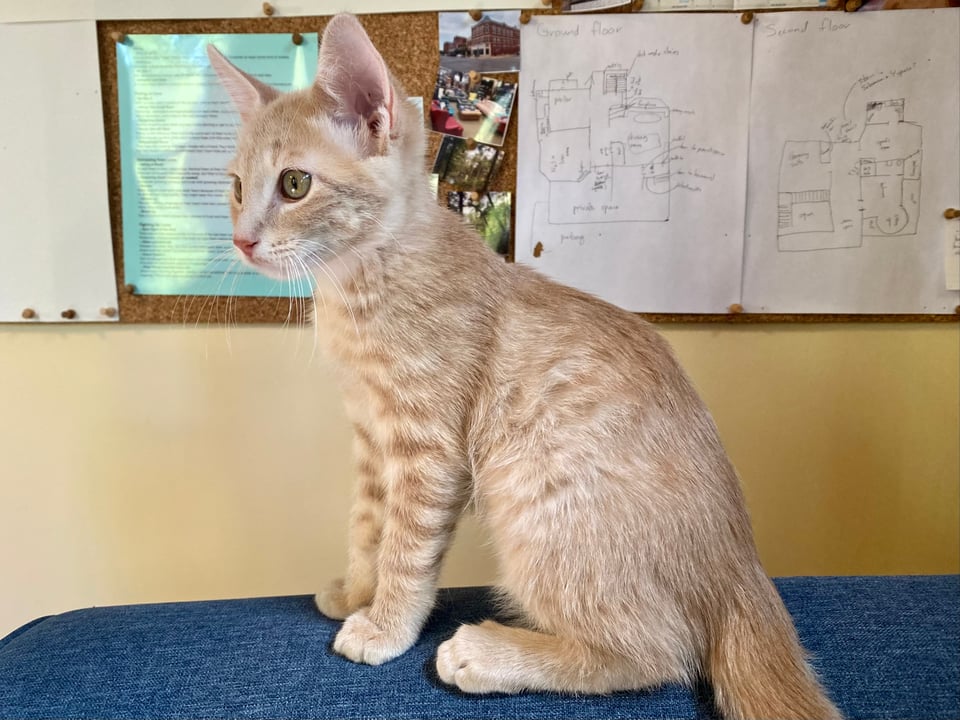What's in Your Name?

Hello everyone!
I’m taking a bit of a break from my series on home security and automation and it’s use of biometric data (here's number 1 and 2 of that), because my mind is on something else.
You might have guessed from the sweet, unfamiliar face above but- we got a kitten! We hadn’t been planning to get a kitten, but our 5 year old kiddo, who we will call Starling for purposes of Internet anonymity, declared that she wanted one and set about proving her dedication and level of responsibility so completely that we couldn’t say no.
I mean. It’s a kitten. Twist my arm.
So, because of this adorable little bundle of purring, furry oxytosin, the subject of names has been very at the forefront of our house conversations this month.
Naturally, since the new little guy is Starling’s kitten, she gets to name him. Turn’s out, she is a pet naming genius. She offered up such winning cat names as Crouton, Diplodocus (Dipper for short), Horizontal, Ozma, Skull, Bartleby, Cuddlebug (Bug for short), Firefly, Mango, and Toot. I love them all.
This list is such a fantastic reflection of her mind.
As an author, one of the things I love about naming characters is that you can cram so much backstory about the character but also the people who named that character- whether that’s parents, other caregivers or forces, or of course the character themself.
What were the aesthetics, priorities, and associations of whoever named them? How does the character feel about and interact with all of that backstory? It tells the readers so much.
I can’t understand why so many authors seem to dislike naming characters. There’s just so much there! What efficient storytelling!
Some of you might have guessed from the title of my next book, Names in Their Blood, that names are a significant theme of that story.
Because names are about identity. YA, superhero stories, and cyberpunk are all, at their base, stories about identity, and the limits and malleability of identity.
From superhero stories we have the fantastic literary convention of superhero names, which I don’t see used to their fullest nearly enough. Superhero names are hyper-public, flashy, condensed declarations of identity. Like an online handle, writ large. They speak to the current pressure to compress yourself into something bite-sized and easy to understand in fast paced informational channels.
If you can only be one thing, what will you choose to be? If you have to make yourself understood in a word, what is that word?
What is it like, to be condensed in that way?
What does it mean, to be called by that name instead of the name you lived the rest of your life with?
Very minor spoilers but there’s a character in Names in Their Blood who is trans and spends the whole book trying on different potential new names. That was partly a deliberate act of normalization on my part, and partly and excuse to use a bunch of the potential baby names we considered for Starling that didn’t make the cut for one reason or another.
And also, I was enthralled by the idea of a character who uses many names, chosen herself, that show us so many aspects of herself and her self concept. I can pack so much character into those name choices. And it’s like the reverse of the superhero name- a great unspooling of angles and lenses that doesn’t try to combine into a single easily decipherable picture.
And then there’s the cyberpunk aspect of the book. I’ve often described the whole Second Sentinels series as low neon cyberpunk.
For me, the draw of cyberpunk has always been where it explores how much you can change a person and have them still be the same person, vs when they become someone or something new.
What does it mean, to move away from purely a narrative of “discovering” oneself, to one that includes deciphering oneself, building oneself by ones own choices, and also, sometimes, being altered past easy recognition by forces you didn’t ask for and didn’t control?
Because in my mind, those are all very typical human experiences that most of us will experience.
Which of these experiences call for a change or replacement of someone’s name? When is a name an anchor keeping you tied to parts of yourself you don’t want to loose, and when is it a discarded cicada shell?
Name changes are so incredibly common and I get so excited by the ways they supplant or overlap each other. We have the name we’re born with. We can have names running alongside like petnames, nicknames, usernames, stage names or pen names.
I had a great time choosing my pen name. I absolutely love it. I just about drove Ty nuts with obsessing about it.
Then there are the names that supplant—married names, names chosen for congruence with gender, or just because you got sick of being in a graduating class with 10 other people with your same name, or because you didn’t like your first name.
My grandfather went so exclusively by his surname that even my grandmother—who he gave that surname to when they got married—wasn’t allowed to call him by his first name. Only his mother, who gave him the name he hated, and his oldest sister were allowed to use it.
Names are such a fascinating social contract because of their complete ubiquitousness. They are at once intimate histories, personal declarations, and cultural artifacts. They’re treated on one hand as immutable constants and on the other they get changed constantly.
But those name changes don’t necessarily line up with actual changes to a person’s self-concept.
I myself am headed to Iowa, where I traveled 14 years ago expressly to get myself a new surname to match my mate, because it was cheaper to stay the night in Iowa and get a marriage license than to buy two surname changes in Minnesota.
That day didn’t change me, and didn’t even reflect a change in my identity that had already occurred. I changed my name because the social constructs around me suggested it as a tool to encode my loyalties into every introduction.
And, if I’m being honest, because I wanted to be defiant in the face of people who wanted to deny my loyalty. I wanted them to have to call them by my married name so that they could not completely deny my marriage.
Not unrelated to the way assholes try to deny the new names of trans people.
I could say more. I did say more. I wrote a novel. But let me close out on the information I’ve teased earlier.
The kitten’s name is Jasper. It caught me completely by surprise. It was such a normal name compared to many of the names on Starling’s list, and I know she wasn’t worried about normalcy.
I asked her about it, and she named him for one of the rocks she likes in the family rock collection. I love that for the rest of her life, the name of her cat will be a little bit of personal archeology- a snapshot of what mattered to her when she had a small kitten and small hands, playing with small rocks on the windowsill.
Thank you so much for reading. Please enjoy these additional pictures of Jasper, as a token of my gratitude.



As always, thanks for joining me, and please feel encouraged to invite anyone you think might like to join us.
Till next month,
Lee Brontide
Thank you for joining me for another month of Shed Letters. If you know someone who you think would like to join us, please feel personally invited to share any of these emails, or send them an invitation to sign up here. And remember that Secondhand Origin Stories is available for free as an ebook here, or in paperback form from your local independent book shop.
Add a comment: